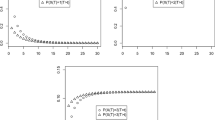Abstract
We consider the component testing problem of a device that is designed to perform a mission consisting of a random sequence of phases with random durations. Testing is done at the component level to attain desired levels of mission reliability at minimum cost. The components fail exponentially where the failure rate depends on the phase of the mission. The reliability structure of the device involves a series connection of nonidentical components with different failure characteristics. The optimal component testing problem is formulated as a semi-infinite linear program. We present an algorithmic procedure to compute optimal test times based on the column generation technique, and illustrate it with numerical examples.
Similar content being viewed by others
References
Alam, M., & Al-Saggaf, U. (1986). Quantitative reliability evaluation of repairable phased-mission systems using Markov approach. IEEE Transactions on Reliability, 35, 498–503.
Altınel, I. (1990). System based component test problem: the design of optimum system based component test plans. Ph.D. thesis, University of Pittsburgh, Department of Industrial Engineering, Pittsburgh.
Altınel, I. (1994). The design of optimum component test plans in the demonstration of system reliability. European Journal of Operational Research, 78, 97–115.
Altınel, I., & Özekici, S. (1998). Optimum component test plans for systems with dependent components. European Journal of Operational Research, 111, 175–186.
Altınel, I., Özekici, S., & Feyziog̃lu, O. (2001). Component testing of a repairable system in multistage missions. Journal of the Operational Research Society, 52, 937–944.
Altınel, I., Özekici, S., & Feyziog̃lu, O. (2002). Component testing of a series system in a random mission. Reliability Engineering and System Safety, 78, 33–43.
Çakmak, U., & Özekici, S. (2006). Portfolio optimization in stochastic markets. Mathematical Methods of Operations Research, 63, 151–168.
Charnes, A., & Cooper, W. (1962). System evaluation and repricing theorems. Management Science, 9, 209–228.
Çınlar, E., & Özekici, S. (1987). Reliability of complex devices in random environments. Probability in the Engineering and Informational Sciences, 1, 97–115.
Easterling, R., Mazumdar, M., Spencer, F., & Diegert, K. (1991). System based component test plans and operating characteristics: binomial data. Technometrics, 33, 287–198.
Erdem, A., & Özekici, S. (2002). Inventory models with random yield in a random environment. International Journal of Production Economics, 78, 239–253.
Esary, J., & Ziehms, H. (1975). Reliability analysis of phased missions. In Proceedings of the conference on reliability and fault tree analysis (pp. 213–236). Philadelphia: SIAM.
Gal, S. (1974). Optimal test design for reliability demonstration. Operations Research, 22, 1236–1242.
Goberna, M., & Lopez, M. (1998). Linear semi-infinite optimization. Series in Mathematical Methods in Practice: Vol. 2. Chichester: Wiley.
Horst, R., & Tuy, H. (1996). Global optimization deterministic approaches (3rd ed.). Heidelberg: Springer.
Ibaraki, T., & Katoh, N. (1988). Resource allocation problems: algorithmic approaches. Cambridge: MIT Press.
Kim, K., & Park, K. (1994). Phased-mission system reliability under Markov environment. IEEE Transactions on Reliability, 43, 301–309.
MATLAB (2002). Optimization users guide (4th ed.). Natick: Mathworks Inc.
Mazumdar, M. (1977). An optimum procedure for component testing in the demonstration of series system reliability. IEEE Transaction on Reliability, 26, 342–345.
Mura, I., & Bondavalli, A. (1999). Hierarchical modelling and evaluation of phased-mission systems. IEEE Transactions on Reliability, 48, 360–368.
Mura, I., & Bondavalli, A. (2001). Markov regenerative stochastic Petri nets to model and evaluate phased mission systems dependability. IEEE Transactions on Computers, 50, 1337–1351.
Özekici, S. (1996). Complex systems in random environments. In S. Özekici (Ed.), NATO ASI Series: Vol. F154. Reliability and maintenance of complex systems (pp. 137–157). Berlin: Springer.
Prabhu, N., & Zhu, Y. (1989). Markov-modulated queueing systems. Queuing Systems, 5, 215–246.
Rolski, T., Schmidli, H., Schmidt, V., & Teugels, J. (1999). Stochastic processes for insurance and finance. Chichester: Wiley.
Author information
Authors and Affiliations
Corresponding author
Rights and permissions
About this article
Cite this article
Altınel, İ.K., Çekyay, B., Feyzioğlu, O. et al. Mission-Based Component Testing for Series Systems. Ann Oper Res 186, 1–22 (2011). https://doi.org/10.1007/s10479-010-0816-9
Published:
Issue Date:
DOI: https://doi.org/10.1007/s10479-010-0816-9




